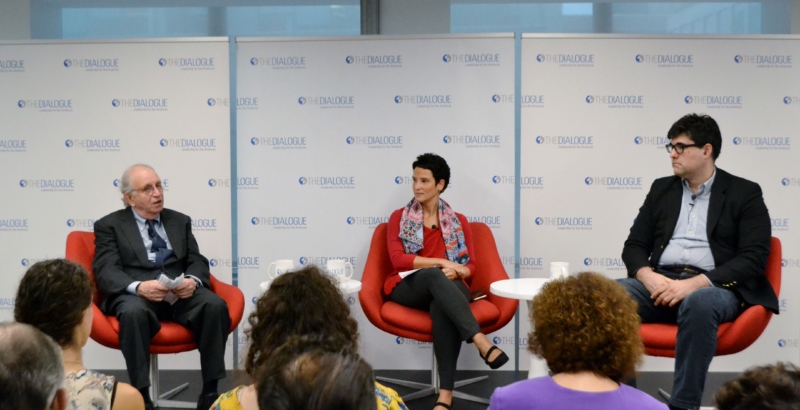Rising Brazil: The Choices Of A New Global Power
What should we expect from a newly powerful Brazil? Does the country have the capacity and leadership to be a central actor in addressing critical global and regional problems?
On September 25th, 2018, the Inter-American Dialogue and Johns Hopkins School of Advanced International Studies (SAIS) hosted an event to address the other key factors in 2018 election featuring Monica de Bolle, director of the Latin American Studies department at the Johns Hopkins School of Advanced International Studies and Mauricio Moura, the CEO and founder of IDEIA Big Data. The event was moderated by Peter Hakim, president emeritus of the Dialogue. The event focused on key development in the election, including discussions of Jair Bolsonaro, the strength of the Workers’ Party (PT) and what happened to centrist parties.
Bolsonaro’s candidacy has been the main focus of most discussions on the Brazilian election. De Bolle remarked that a big fear among analysts was the “hidden” Bolsonaro voter, or people who didn’t want to openly say they were voting for Bolsonaro, therefore reducing his actual popularity in polls; however, de Bolle noted that recent polls seemed to suggest that his polling numbers were accurate. De Bolle continued by saying she felt the only scenario where Bolsonaro could win would be in a runoff against PT candidate Fernando Haddad. Moura agreed with de Bolle that Bolsonaro would have a strong campaign in the second round by positioning himself as the “anti-PT” candidate. However, Moura felt that Bolsonaro would not have an effective presidency, if elected, because of his inability to form coalitions with other political parties. Specifically, his proposal to consolidate different ministries would reduce the number of positions available to potential coalition partners. De Bolle agreed with this assessment, but cautioned that Bolsonaro was a much more severe change than just the “anti-PT.” De Bolle touched upon comparisons between Bolsonaro and Trump, which have been common in English-language media, but felt the comparison was too simplistic. While there are similarities in Bolsonaro’s anti-establishment rhetoric, his policies and ideology are uniquely Brazilian.
.@bollemdb says that Brazilian institutions are in complete disarray, which has led to increased polarization in the political system. https://t.co/7RtWOo662f pic.twitter.com/H6Cz6z6Zb6
— The Inter-American Dialogue (@The_Dialogue) September 25, 2018
Moura and de Bolle also both looked at the support behind the PT. While Haddad’s campaign has focused on traditional PT strongholds in the Northeast region of the country, both Moura and de Bolle felt that his campaign has not been quite as successful as Lula and Dilma’s previous campaigns. In fact, de Bolle felt that more PT voters remained “hidden,” compared to the hidden Bolsonaro voters she expressed worry about previously. Looking forward to a runoff between Bolsonaro and Haddad, Moura added that the PT had a greater challenge. While Bolsonaro could simply be the “anti-PT,” the PT has the responsibility of proving why Bolsonaro would be bad for Brazilians. Moura and de Bolle agreed that this would be much more complicated. In addition, Moura added that while Haddad is clearly in second place in the polls, the PT currently faces high rejection rates in the South and Southeastern regions, which would make it difficult to win.
Finally, de Bolle and Moura the role of the voto nulo, or “no vote” in the election and looked at more centrist candidates. Moura noted that google searches for “how to cast a blank ballot,” and other similar search terms, had increased by 200% during this election cycle. De Bolle felt that these votes would have a significant impact on the outcome of the election, and also highlighted how whichever candidate wins will face unusually high rejection rates.
Beginning with the impeachment of Dilma Rousseff in 2015, Brazilian society has faced increasing polarization. At the time of our event, de Bolle felt that there was still a small chance for a more centrist candidate to gain over Haddad, but that the window was small. At the same time, while it appears difficult for a centrist candidate to win the presidency, parties of the Centrão will dominate Congress, meaning whoever wins will have to form coalitions with centrist parties in order to get any reforms or policies approved. De Bolle cautioned that this extreme polarization could lead to a political paralysis of sorts, which could ultimately impact the economy, public security, and foreign policy.
The #BrazilianElection has become so polarized that many #Bolsonaro voters are just anti-PT and many #PT voters are just anti-Bolsonaro. @bollemdb asks, what does this mean going forward? pic.twitter.com/Tog60mZIvz
— The Inter-American Dialogue (@The_Dialogue) September 25, 2018
The session ended with questions from the audience about Bolsonaro’ s current economic plan, top three issues in the election, the role of social media, and the profile of the voter for the center.
What should we expect from a newly powerful Brazil? Does the country have the capacity and leadership to be a central actor in addressing critical global and regional problems?
President Lula da Silva triumphantly announced that he and his Turkish counterpart had persuaded Iran to shift a major part of its uranium enrichment program overseas—an objective that had previously eluded the US and other world powers. Washington, however, was not applauding.
An upcoming meeting between Presidents Obama and Rousseff should not be expected to produce dramatic news or unexpected major breakthroughs.
 Inter-American Dialogue // Irene Estefanía González
Inter-American Dialogue // Irene Estefanía González